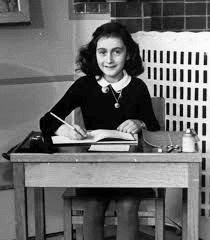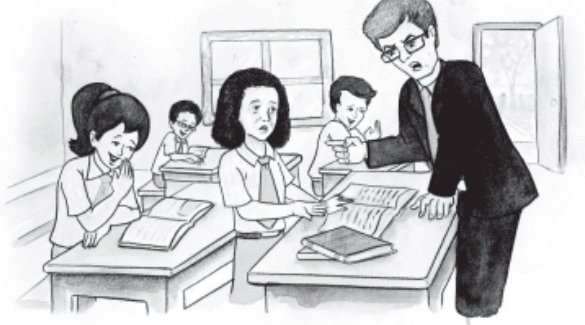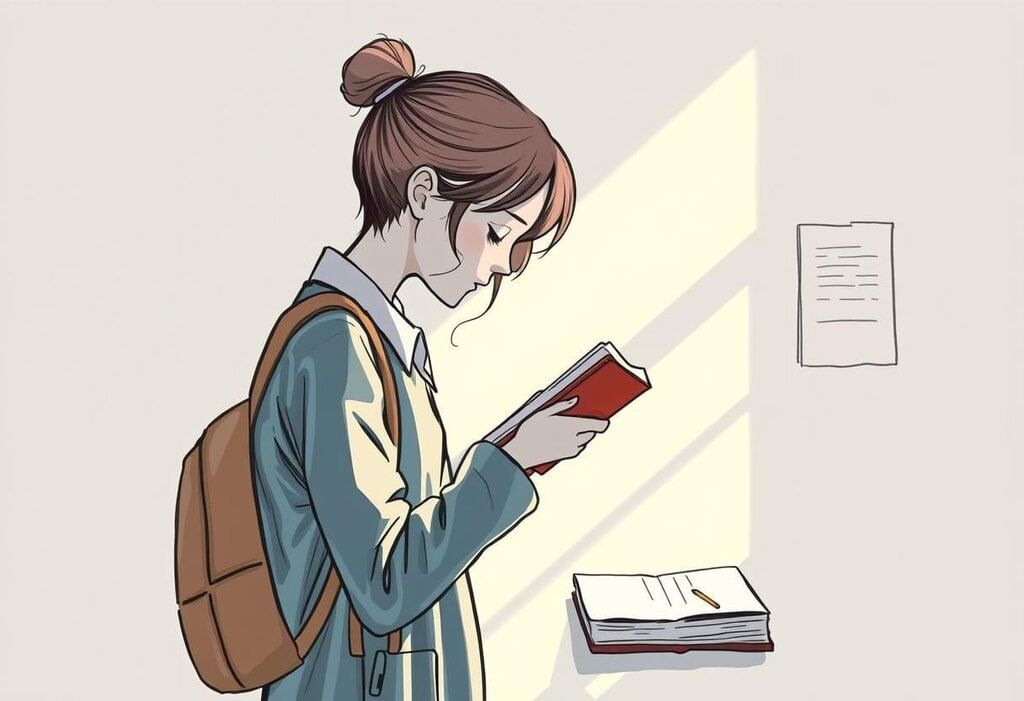Class 10 English Chapter 4 Previous Year Questions - From the Diary of Anne Frank
Previous Year Questions 2025
Q1: Read the given extracts and answer the questions:
“Paper has more patience than people. I thought of this saying on one of those days when I was feeling a little depressed and was sitting at home with my chin in my hands, bored and listless, wondering whether to stay in or go out. I finally stayed where I was, brooding: Yes, paper does have more patience, and since I’m not planning to let anyone else read this stiff-backed notebook grandly referred to as a ‘diary’, unless I should ever find a real friend, it probably won’t make a bit of difference.”
(i) In light of the extract, what can we infer about the speaker’s emotional state? (1 Mark)
 View Answer
View Answer 
Ans: The speaker, Anne Frank, feels lonely, bored and slightly depressed, showing a sense of emotional isolation and a desire to express her feelings.
(ii) The narrator enhances the narrative technique of the extract by using: (2 Marks)
(a) descriptive language
(b) literary allusions
(c) humour
(d) reflective
 View Answer
View Answer 
Ans: (d) reflective
The narrator enhances the narrative technique of the extract by using (d) reflective language.
Anne reflects deeply on her feelings and thoughts, making the passage introspective and thoughtful.
(iii) Fill in the blank with the correct word from the bracket:
The narrator doesn’t plan to let anyone read her diary as she doesn’t have any real ____ (friend / incidents). (1 Mark)
 View Answer
View Answer 
Ans: Friend
The narrator doesn’t plan to let anyone read her diary as she doesn’t have any real friend.
(iv) Why does the narrator say that ‘paper has more patience than people’? (1 Mark)
 View Answer
View Answer 
Ans: Anne says that “paper has more patience than people” because paper listens silently and without judgment, unlike people who may not always be willing to listen or understand her feelings.
Q2: The journeys of Anne Frank and Valli teach us the vital lesson that optimism and self-assurance empower women to rise above circumstances and overcome obstacles. Examine the similarities. (6 Marks)
 View Answer
View Answer 
Ans: Both Anne Frank from “From the Diary of Anne Frank” and Valli from “Madam Rides the Bus” display remarkable optimism, courage, and self-assurance, which help them rise above their circumstances.
Anne Frank, a thirteen-year-old Jewish girl, remains hopeful even while living in hiding during the Nazi occupation. Despite fear, loneliness, and uncertainty, she finds comfort in writing her diary. Through her reflections, she shows emotional strength and maturity, believing in goodness and expressing hope for a better future. Her diary becomes her trusted friend and symbol of endurance.
Similarly, Valli, an eight-year-old girl, shows determination and independence. Her dream of riding a bus to the town is small but meaningful. She plans carefully, saves money, and confidently undertakes the journey alone. Her curiosity, courage, and sense of adventure reveal her self-confidence and independence.
Both Anne and Valli prove that age and gender are no barriers when one possesses inner strength. They teach that optimism, curiosity, and self-belief enable young girls to overcome fear, loneliness, and limitations, making them inspiring examples of youthful courage.
Previous Year Questions 2024
Q1: Read the following extracts and answer the questions: (CBSE 2024)
(A) I started right away at the Montessori Nursery School. I stayed there until I was six, at which time I started in the first form. In the sixth form, my teacher was Mrs. Kuperus, the headmistress. At the end of the year we were both in tears as we said a heartbreaking farewell. In the summer of 1941, Grandma fell ill and had to have an operation, so my birthday passed with little celebration.

(i) “In the summer of 1941, Grandma fell ill and had to have an operation, so my birthday passed with little celebration.”
State any one inference about Anne from the above context.
 View Answer
View Answer 
Ans: Anne was attached to her grandmother.
(ii) The first education of Anne started at ___________.
(a) some Kindergarten School
(b) a Nursery School
(c) Montessori Nursery School
(d) Elementary School
 View Answer
View Answer 
Ans: (c) Montessori Nursery School
Anne Frank's early education began at a Montessori Nursery School. This is documented in her diary and historical records, which highlight her early schooling in Amsterdam before her family went into hiding during World War II.
(iii) Who was Mrs. Kuperus? What kind of relationship did Anne share with her?
 View Answer
View Answer 
Ans: She was Anne’s teacher in the Sixth form and also the headmistress. Both were attached to each other.
(iv) Substitute the word ‘heartbreaking’ with a word similar in meaning in the following sentence:
“At the end of the year we were both in tears as we said a heartbreaking farewell.”
 View Answer
View Answer 
Ans: emotional
(B) Anyone could ramble on and leave big spaces between the words, but the trick was to come up with convincing arguments to prove the necessity of talking. I thought and suddenly I had an idea. I wrote the three pages, Mr. Keesing had assigned me and was satisfied. I argued that talking is a students’ trait and that I would do my best to keep it under control, but that I would never be able to cure myself of the habit since my mother talked as much as I did if not more, and that there’s not much you can do about inherited traits. (From the Diary of Annie Frank) (CBSE 2024)
(i) State any one inference about Anne from the given context.
“Anyone could ramble on and leave big spaces between the words, but the trick was to come up with convincing arguments to prove the necessity of talking.”
 View Answer
View Answer 
Ans: One inference about Anne from the given context is that she is thoughtful and reflective about her own behavior, specifically her talkative nature.
(ii) In about 40 words, elaborate on the justification Anne gives for her talkative nature.
 View Answer
View Answer 
Ans: Anne justifies her talkative nature by explaining that talking is not just about filling space with words, but about presenting convincing arguments and proving the necessity of communication. She believes that her talkativeness has a purpose and is not just idle chatter.
(iii) Which one of the following best describes the tone of the given extract?
(a) derogatory
(b) persuasive
(c) nostalgic
(d) cautionary
 View Answer
View Answer 
Ans: (b) persuasive
The tone of the given extract is best described as (b) persuasive. Anne is trying to persuade the reader that her talkative nature is justified and necessary.
(iv) Which phrase would correctly substitute ‘ramble on’ in the given sentence from the extract?
 View Answer
View Answer 
Ans: The phrase that would correctly substitute 'ramble on' in the given sentence from the extract is 'talk aimlessly'.
 Q2: You have been chosen to address the school assembly on the occasion of Women’s Day. You choose to speak on the resilience and indomitable spirit of the young girls: Anne Frank and Valli. Prepare the speech draft, with reference to the commonality and contrast in the situations and circumstances of both the girls.(Madam Rides the Bus and From the Diary of Anne Frank)You may begin like this: Good morning everyone. Today, I’d like to express my insights on the resilience of two young girls ……….. .
Q2: You have been chosen to address the school assembly on the occasion of Women’s Day. You choose to speak on the resilience and indomitable spirit of the young girls: Anne Frank and Valli. Prepare the speech draft, with reference to the commonality and contrast in the situations and circumstances of both the girls.(Madam Rides the Bus and From the Diary of Anne Frank)You may begin like this: Good morning everyone. Today, I’d like to express my insights on the resilience of two young girls ……….. .
You may end this way : To conclude I’d like to say that ……………… .
Thank you. (CBSE 2024)
 View Answer
View Answer 
Ans: Good morning everyone. Today, I’d like to express my insights on the resilience of two young girls Anne and Valli.
Anne and Valli are lonely and do not have any friends. Anne’s desire to share her deepest feelings with a close friend makes her write her feelings in a diary which she calls her friend ‘Kitty’. Valli spends her time watching the street outside her house and is attracted to the bus which crosses the street as it goes from the village to the town and vice versa. She develops a desire to take the bus ride and does a lot of work to make it a success.
When Anne faces a challenge of writing an assignment as a punishment for her talking in the Maths class, she accepts it and presents valid arguments and reasons that it is beyond her control. She successfully convinces the Maths teacher Mr Keesing who becomes jovial and stops pointing out Anne. When Valli encounters strangers and the over friendly bus conductor, she is on guard and does not accept any favours. When she sees the dead cow who had been running around sometime back, she learns an important lesson about the momentary nature of life.
To conclude I’d like to say that both Anne and Valli are mature for their age. Both the girls are strong and fight their battles by themselves.
Thank you.
Q3: Based on your understanding of the Play, ‘The Proposal’, what do you think of relationships?
Prepare a speech draft on relationships based on Natalya’s and Anne Frank’s characters.
You may begin this way.
Good morning everyone.
Relationships are the bond between two people based on mutual likes, understanding, need or love. I’d like to discuss relationships as portrayed in the two texts ……..
You may end this way
To conclude, I’d like to say that ….. .
Thank you,
(Reference : The Proposal & from the Diary of Anne Frank) (CBSE 2024)
 View Answer
View Answer 
Ans: Good morning everyone.
Relationships are the bond between two people based on mutual likes, understanding, need or love. I’d like to discuss relationships as portrayed in the two texts The Proposal and From the Diary of Anne Frank.
In The Proposal, we see the two characters of Natalya and Lomov who are grown up individuals but lack maturity. They enter into arguments on trivial matters and overlook the solemn relationship that they are about to enter into. This reflects their england pride which does not allow them to show affection towards each other. Thus, both of them try to show the other low.
On the other hand, Anne Frank is a young girl who shows maturity through her diary entries. We get to know about the bond that she shares with her family. She has great attachment with her grandmother and did not even celebrate her birthday due to the grandmother’s illness. During the war, the family faces separation and a lot of trouble but they have the strength to support each other.
To conclude, I’d like to say that relationships have to be maintained through understanding and affection. Mutual love and respect are the pillars of an everlasting relationship. Creating everlasting bonds is essential because a family is the biggest treasure.
Thank you
Q4: Amanda from the poem ‘Amanda’ is a teenager like Anne Frank and lives in her fantasy world whereas Anne is a chatter box. What conversation will Anne Frank have with Amanda about different perspectives of life? Write your answer in about 120 words. (CBSE 2024)
 View Answer
View Answer 
Ans: As Anne is talkative in nature, she will start a conversation with Amanda. When Anne will come to know that Amanda is disturbed due to her mother’s constant nagging, Anne will understand her situation. Anne is a wise and mature girl. She will try to convince Amanda that her mother is scolding her for Amanda’s benefit. Anne will also advice her to think positively because parents think the best for their child. Anne will be sympathetic towards Amanda and she can also suggest that whenever Amanda’s mom scolds her, Amanda can try to justify her act just like Anne did with her Maths teacher. To conclude, Anne will sum up that Amanda should think positively and if she is justified for her acts, then she should come up with intelligent arguments to support her claim and try to convince her mother.
Q5: You have been chosen to address the school assembly, to speak on the epistemology of loss and the resilience of the human spirit during times of crisis. Prepare the speech draft, with reference to the commonality of themes in ‘The Ball Poem’ by John Berryman and ‘From the Diary of Anne Frank’.
You may begin this way :
Good morning everyone.
Today, I’d like to discuss two pieces of literature that offer a powerful insight into how to deal with loss and the resilience of the human spirit required during times of crisis.
You may end this way :
To conclude, I’d like to say that ………….. . Thank you. (CBSE 2024)
 View Answer
View Answer 
Ans: Good morning everyone.
Today, I’d like to discuss two pieces of literature that offer a powerful insight into how to deal with loss and the resilience of the human spirit required during times of crisis. In the poem titled the Ball Poem by John Berryman and the prose titled From the Diary of Anne Frank, the main character learns to cope up with loss and tells us about resilience when she and her family faced trouble.
In The Ball poem the child loses his ball and the poet tells the boy that he has to learn how to handle loss and move ahead in life. He adds that gradually, the boy will cope up with the fact that his ball is lost forever and shall learn to bear losses.
Anne Frank’s diary talks of the various times when she displayed courage and faced challenges with resilience.
To conclude, I’d like to say that both pieces remind us that while loss is inevitable, our ability to endure and grow from it defines our resilience as individuals.
Thank You
Previous Year Questions 2023
Q6: Read the following extract and answer the questions that follow: (2023)(a) I wrote the three pages Mr. Keesing had assigned me and was satisfied. I argued that talking is a student's trait and that I would do my best to keep it under control, but that I would never be able to cure myself of the habit since my mother talked as much as I did, if not more, and that there's not much one can do about inherited traits.
(i) Who was Mr. Keesing?
(a) Maths teacher
(b) Social Science teacher
(c) Warden
(d) Principal
 View Answer
View Answer 
Ans: (a)
Mr. Keesing is identified as Anne’s Maths teacher in The Diary of a Young Girl.

(ii) According to the extract, the incorrigible habit possessed by the speaker was
I. making noise in class
II. talking too much
III. procrastinating
IV. coming late to class
V. asking irritating questions
Select the correct option:
(a) I and III
(b) Only II
(c) I, IV, and V
(d) Only III
 View Answer
View Answer 
Ans: (b)
Anne’s primary habit that Mr. Keesing addresses is her talking too much.
(iii) Complete the analogy by electing the suitable word from the extract
routine: habit:: characteristic:_______
 View Answer
View Answer 
Ans: trait
"Trait" aligns with the characteristic term here.
(iv) Select the reason why the narrator is unable to control her trait.
(a) She had deliberately practiced it
(b) She wanted to be different from her brother
(c) Her teacher had encouraged her to continue as she was
(d) She had inherited it
 View Answer
View Answer 
Ans: (d)
Anne mentions that her mother was also talkative, suggesting a possible influence but not a direct inheritance.
(v) Which of the following most nearly means the opposite of the phrase ‘under control?
(a) to spend less
(b) unable to take on the challenge
(c) find it difficult to manage
(d) being very stubborn
 View Answer
View Answer 
Ans: (c)
This option is a reasonable opposite of "under control."
Previous Year Questions 2021

Q7: "This is why I started the diary”. (Term I, 2021-22)
Anne started her diary
(a) as she could not confide in anyone.
(b) as she was good at writing compositions.
(c) as she wanted to record her feelings for future generations.
(d) as she was secretive by nature.
 View Answer
View Answer 
Ans: (a)
Anne explains that she started her diary because she had no true confidant.
Q8: Anne decided to let only ____ to read her diary. (Term I, 2021-22)
(a) a real friend
(b) her father
(c) her grandmother
(d) her mother
 View Answer
View Answer 
Ans: (a)
The correct answer is (a) a real friend as her diary itself, named "Kitty," is considered Anne’s confidant.
Q9: 'Paper has more patience than people'
(a) One can write anything on paper.
(b) People have good ears for listening.
(c) One can write one's diary even at night.
(d) One may express one's anger on paper. (CBSE Term-1 2021)
 View Answer
View Answer 
Ans: (a)
From the Diary of Anne Frank, Anne expresses that "Paper has more patience than people" because she feels she can confide anything in her diary without being judged or interrupted, unlike with people who may not always listen with patience.
Q10: Mr. Keesing was annoyed with Anne as:
(a) she was weak in maths.
(b) she had not done her home work.
(c) she was a naughty girl.
(d) she was very talkative. (CBSE Term-1 2021)
 View Answer
View Answer 
Ans: (d)
Mr. Keesing, Anne’s teacher, was annoyed with her because she talked a lot in class, which he found disruptive. Her talkative nature led him to assign her extra homework as a punishment.
Previous Year Questions 2020
Q11: Anne writes that it was fortunate that Mr. Keesing took the joke the right way. Why does she feel so? (2020-21) View Answer
View Answer 
Ans: Mr. Keesing, her math teacher, appreciated her humorous and creative approach to the essay he assigned her as a punishment for talking too much. Instead of getting angry, he laughed at the poem Anne wrote, which humorously portrayed his strict nature. Mr. Keesing became more tolerant of Anne's talkativeness after the incident, showing that he could take a joke and adapt his perspective. The situation highlighted how Anne's creativity and wit could positively influence others, even authority figures.
Q12: What does Anne write in her first essay titled "A Chatterbox"? (CBSE 2020)
 View Answer
View Answer 
Ans: In her essay, Anne defends her habit of talking by stating that it is a natural characteristic of students, especially girls. She humorously justifies her talkativeness by saying it’s an inherited trait from her mother, who also talks a lot. Anne admits she cannot control her chatter but emphasizes that she would try to improve. Her creative and witty approach to the essay impressed Mr. Keesing, her math teacher.
Previous Year Questions 2018 -19
Q13: Kitty plays a vital role in Anne’s life. Elucidate. (CBSE 2018-19)
 View Answer
View Answer 
Ans: Anne named her diary "Kitty" and treated it as a trusted confidante. She was a private person who rarely shared her thoughts with others, making the diary her emotional outlet. Receiving the diary on her thirteenth birthday was one of her best gifts. She recorded significant events, her feelings, and thoughts on love, morality, politics, and the war in her diary. It became her constant companion, helping her cope with loneliness and providing emotional support. Her diary played a crucial role in her life, capturing moments that no one else could.
Q14: Why did Anne think she could confide more in her diary than in people? (CBSE 2019)
 View Answer
View Answer 
Ans: Anne felt she lacked a true friend with whom she could share her thoughts and feelings. She believed people around her wouldn’t understand her or might judge her emotions. Her diary, which she named "Kitty," became a trusted companion where she could freely express herself. She found solace in writing as paper, unlike people, had the patience to listen without any interruptions or criticism.
Previous Year Questions 2012
Q15: How did Anne regard her diary and what name did she give to it? (CBSE 2012) View Answer
View Answer 
Ans: Anne regarded her diary as her long-awaited friend. She considered it as one with whom she could share her deepest feelings and it would not judge Anne or find her talkative. She named it ‘Kitty’.
|
61 videos|620 docs|69 tests
|
FAQs on Class 10 English Chapter 4 Previous Year Questions - From the Diary of Anne Frank
| 1. What is the main theme of "From the Diary of Anne Frank"? |  |
| 2. How does Anne Frank describe her life in hiding? |  |
| 3. What impact did Anne Frank’s diary have on the world? |  |
| 4. Why is Anne Frank considered an important figure in history? |  |
| 5. What literary devices are used in "From the Diary of Anne Frank"? |  |






















